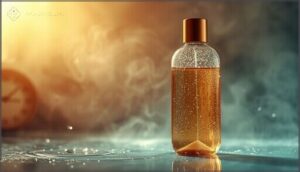This site is supported by our readers. We may earn a commission, at no cost to you, if you purchase through links.
That bottle of shampoo tucked in the back of your shower caddy might be older than you think. Unlike food products with bold expiration dates stamped on every package, shampoos sit in a regulatory gray area—most manufacturers aren’t required to print when their formulas stop working.
The ingredients don’t spoil overnight, but they do break down. Preservatives weaken, active ingredients lose potency, and what once cleaned your hair effectively can shift into something less reliable or even irritating to your scalp.
The chemistry matters because your hair’s health depends on stable formulations. Knowing how long shampoo actually lasts and what signs signal it’s time to toss that bottle protects both your scalp and your styling results.
Table Of Contents
Key Takeaways
- Shampoo does expire as preservatives weaken and active ingredients lose potency over time, typically lasting 2-4 years unopened and 12-24 months after opening, with the Period After Opening (PAO) symbol serving as your most reliable guide to shelf life.
- You’ll know your shampoo has expired when it changes texture (separates, thickens, or becomes watery), develops an off smell, shifts color, or stops lathering properly—these are chemical signs that the formula’s stability has broken down.
- Proper storage in cool, dark cabinets away from heat and humidity can extend your shampoo’s effectiveness, while bathroom heat and moisture accelerate degradation and increase contamination risks from bacterial growth.
- Using expired shampoo won’t typically cause permanent damage but can trigger scalp irritation, reduce cleaning effectiveness, and in contaminated bottles (found in over 56% of expired samples), potentially lead to infections requiring medical treatment.
Does Shampoo Expire?
Yes, shampoo does expire, though not in the same way food does. Over time, the ingredients in your shampoo break down, making the product less effective and potentially unsafe for your scalp and hair.
Let’s look at what expiration actually means for shampoo, why you won’t always find a date stamped on the bottle, and how to read the symbols that manufacturers do include.
What Expiration Means for Shampoo
Shampoo expiration marks the point when formulation stability breaks down and chemical changes compromise performance. Surfactant breakdown reduces cleansing power, while preservative efficacy declines, raising contamination risks.
These shifts in shampoo degradation alter pH levels and may trigger scalp irritation. Though product expiration dates aren’t always printed, understanding shelf life helps you avoid using deteriorated formulas that won’t deliver expected results.
To better understand the concept of expiration, checking the shampoo expiration dates is essential for maintaining hair and scalp health.
Why Expiry Dates Are Rarely Printed
Regulatory frameworks in the U.S. and EU don’t require shampoo expiration dates on most rinse-off products because stability testing proves they remain safe beyond 30 months. Manufacturing guidelines focus on cosmetic safety through internal data rather than mandating printed expiration policies.
You won’t find product expiration dates on many bottles, but labeling standards require PAO symbols in Europe—your guide to shelf life once opened.
Companies rely on cosmetic stability testing to verify the quality and safety of their products.
Understanding The Period After Opening (PAO) Symbol
Instead of a fixed expiration date, you’ll spot an open-jar icon with a number and “M”—that’s the Period After Opening symbol showing how many months your shampoo stays safe and effective once opened. EU cosmetic regulation requires this PAO marking on products lasting beyond 30 months, ensuring you understand product stability through tested labeling standards.
Here’s what the PAO symbol tells you about cosmetic safety and shampoo expiration:
- 12M or 24M indicates shelf life testing confirmed your bottle performs reliably for one to two years after opening
- The countdown begins when you first break the seal, not when you purchased it
- Manufacturers no longer guarantee full safety or cleaning power once that window closes
- Your humid shower accelerates degradation, making the PAO period your realistic deadline
- Marking your opening date on the bottle helps you track when to replace it
How Long Does Shampoo Last?
Shampoo doesn’t last forever, but the timeline depends on whether you’ve opened the bottle yet. Once you break that seal, the clock starts ticking faster than you might expect.
Let’s look at what you can realistically expect from your shampoo in different situations.
Shelf Life of Unopened Shampoo
When stored properly, your unopened shampoo can last 2 to 4 years. Storage conditions play a vital role—heat above 77°F can cut shelf life in half by breaking down preservatives. Keep bottles in cool, dark cabinets away from sunlight and humidity to maintain chemical stability and product effectiveness.
| Storage Factor | Impact on Shelf Life |
|---|---|
| Cool, dark cabinet | Extends life up to 24 months |
| High heat (>86°F) | 40% faster preservative decline |
| High humidity | Reduces life to Every year, over 552 million shampoo bottles enter U.S. landfills, where each will take 450 years to decompose |
But it’s not just waste management—ingredients like 1,4-dioxane seep into water systems, causing contamination that affects ecosystems. Your hair care choices carry a real carbon footprint and environmental cost.
Alternative Uses for Old Shampoo
Instead of tossing expired shampoo, put it to work. Your old hair care products contain surfactants that excel at breaking down oils and dirt—making them surprisingly effective for household hacks beyond beauty products:
- Pet cleaning: Dilute it for washing paws or fur in emergencies (61% of veterinarians approve)
- Tool maintenance: Remove grease from garden equipment and bicycle chains
- Fabric care: Clean delicate wool or lingerie gently
- Household surfaces: Scrub toilets, tiles, and stainless steel fixtures
- Creative repurposing: Pre-treat laundry stains or wash makeup brushes
This approach reduces waste while extending your hair maintenance budget.
Frequently Asked Questions (FAQs)
Can expired shampoo cause permanent hair damage?
Like vinyl records making a comeback, expired shampoo rarely causes permanent hair loss—but scalp infections from bacterial contamination (found in over 56% of expired samples) can trigger patchy hair damage requiring medical treatment.
Does freezing shampoo extend its shelf life?
Freezing shampoo doesn’t reliably extend shelf life. Cold temperature may cause phase separation and preservative redistribution, increasing contamination risk.
Refrigeration at 4°C works better than frozen storage for preserving shampoo stability and preventing degradation.
Are salon shampoos more likely to expire faster?
Salon shampoo often promises purity yet expires faster—usually within 12–18 months after opening—because gentler preservatives and botanical ingredients offer less stability than the synthetic compounds found in conventional hair care cosmetics and beauty products.
Can you test shampoo before it expires?
You can test shampoo by checking its texture, smell, and appearance regularly. Look for lumps, separation, or foul odors—signs of chemical change.
Proper storage tips help preserve efficacy until the PAO expiration date.
Do shampoo bars expire like liquid shampoos?
Shampoo bars do expire, but their solid formulations give them an edge. With minimal water activity, microbial risk drops considerably—so bars typically outlast liquid shampoos by months or even years when stored dry.
Conclusion
Preservatives protect, but they don’t last forever. Your shampoo’s chemistry shifts quietly over months and years, weakening its ability to clean effectively while increasing the risk of irritation or contamination. Checking whether shampoos expire isn’t about paranoia—it’s about respecting what you put on your scalp.
Store bottles properly, watch for texture changes, and replace formulas that smell off or separate. Fresh products work better, feel safer, and keep your hair healthier than anything lingering past its prime.
- https://luxe-cosmetics.com/blogs/news/how-long-does-shampoo-last
- https://www.artistryswfl.com/blogs/news/shampoo-expiration-how-long-does-shampoo-last
- https://www.healthline.com/health/does-shampoo-expire
- https://www.nature.com/articles/s41598-024-69624-9
- https://yeserchem.com/preservatives-in-shampoo-ensuring-quality-safety-and-longevity/





